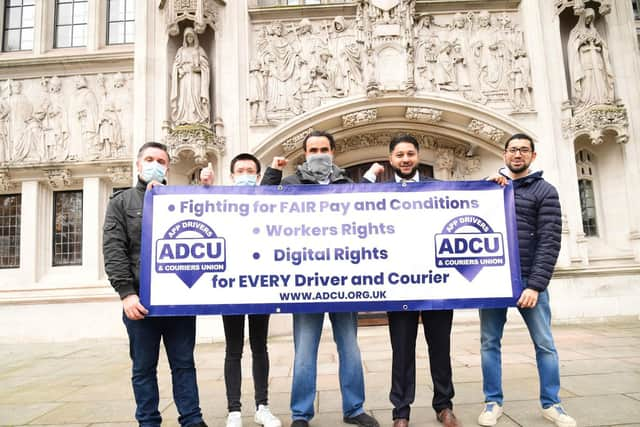Uber ruling will ‘greatly benefit’ Leeds drivers, says cab drivers’ chief
and live on Freeview channel 276
UK Supreme Court justices this week ruled Uber drivers were indeed workers for the company, rather than third party contractors.
This, say lawyers acting on behalf of union GMB, means Uber drivers will now be entitled to workers’ rights such as holiday pay. Uber, however says ‘worker’ is not the same status as an employee, and that the ruling will only apply to a small number of its drivers.
Advertisement
Hide AdAdvertisement
Hide AdGhulam Nabi is secretary of Eurocabs Hackney Carriage Association. He said that the ruling will greatly benefit Uber’s drivers, and will have an impact on working conditions in the industry as a whole.


He said: “I think it will greatly benefit the Uber drivers as Uber have not managed the growth of their business properly and flooded the market for their personal gain, but didn’t consider the impact on the drivers’ income.
“As for this decisions impact on our trade and other Private Hire companies again it will be positive as Uber were undercutting the fares by around 40 per cent and subsidising them and they will have to reconsider that decision to make themselves financially viable and increase the fares.
“Other Private Hire companies will also have to abide by this ruling.”
Advertisement
Hide AdAdvertisement
Hide AdUK Supreme Court justices made their latest ruling on a long-running battle between Uber and its drivers on Friday.
Lawyers say the ruling means Uber drivers will be entitled to workers’ rights such as holiday pay, and will have implications for the gig economy.
Following the ruling, a statement from Uber said a “worker” is a legal classification that is specific to the UK, and is different an “employee” or someone who is self-employed. It claims that, as employee status was not claimed in the litigation, the ruling did not find the claimants to be employees.
Jamie Heywood, Uber’s regional general manager for Northern and Eastern Europe, said: “We respect the court’s decision which focussed on a small number of drivers who used the Uber app in 2016.
Advertisement
Hide AdAdvertisement
Hide Ad“Since then we have made some significant changes to our business, guided by drivers every step of the way. These include giving even more control over how they earn and providing new protections like free insurance in case of sickness or injury.
“We are committed to doing more and will now consult with every active driver across the UK to understand the changes they want to see.”
An employment tribunal ruled in 2016 that Uber drivers were workers, and were entitled to workers’ rights. The ruling was later upheld by Court of Appeal judges.
According to the Press Association, lawyers representing Uber operating companies told Supreme Court justices that the employment tribunal ruling was wrong. They said drivers did not “undertake to work” for Uber but were “independent, third party contractors”.
Advertisement
Hide AdAdvertisement
Hide AdBut lawyers representing drivers said the tribunal was entitled to conclude that drivers were working.
Justices unanimously ruled against Uber.
According to the Advisory, Conciliation and Arbitration Service (ACAS), you’re classed as an employee if you have an employment contract from your employer, formed when you accept the job, are employed to do the work personally and must do the work.
An employee has rights to a minimum sick, holiday and parental leave pay
being able to claim redundancy and unfair dismissal after two years’ service.
Advertisement
Hide AdAdvertisement
Hide AdA “worker” is a broader term that can include more casual employment or “zero hours” contracts.
However, a worker is still entitled to National Minimum Wage, paid holiday, payslips, protection against unlawful discrimination, protection for ‘whistleblowing’ and not being treated unfairly if you work part time.